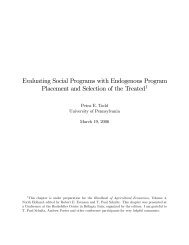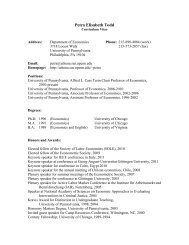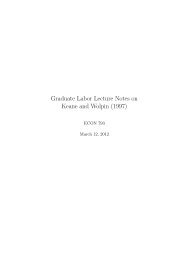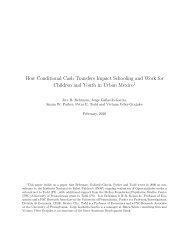Notes on Regression Discontinuity Methods - [athena.sas.upenn ...
Notes on Regression Discontinuity Methods - [athena.sas.upenn ...
Notes on Regression Discontinuity Methods - [athena.sas.upenn ...
You also want an ePaper? Increase the reach of your titles
YUMPU automatically turns print PDFs into web optimized ePapers that Google loves.
RD Examples: Lee (2007, J of Ec<strong>on</strong>ometrics)<br />
Effect of incumbancy advantage<br />
• Uses data <strong>on</strong> US C<strong>on</strong>gressi<strong>on</strong>al electi<strong>on</strong> returns from 1946 to 1998.<br />
• Analyzes the effect of the incumbancy advantage at the level of the<br />
party at the district level, without regard to the identify of the<br />
nominee for the party.<br />
• For example, analyzes the prob of winning the electi<strong>on</strong> in t+1 given<br />
that democrats w<strong>on</strong> the electi<strong>on</strong> in t, coming districts where they<br />
w<strong>on</strong> by a close margin to districts where they lost by a close margin.<br />
• Paper recommends checking the density of observables to test for<br />
systematic selecti<strong>on</strong> around the cut-off point.<br />
• Finds that democrats who just barely win the electi<strong>on</strong> are much<br />
more likely to run for office and succeed in the next electi<strong>on</strong><br />
compared to democrats who barely lose, which implies a large<br />
incumbency advantage. (also see Moretti and Butler, 2004, QJE)



![Econ 792 Labor Economics Lecture 6 - [athena.sas.upenn.edu] - Penn](https://img.yumpu.com/34045248/1/190x143/econ-792-labor-economics-lecture-6-athenasasupennedu-penn.jpg?quality=85)
![ECON 721 Lecture Notes - [athena.sas.upenn.edu] - Penn](https://img.yumpu.com/27880703/1/190x245/econ-721-lecture-notes-athenasasupennedu-penn.jpg?quality=85)

![Rosen and Willis Slides - [athena.sas.upenn.edu] - Penn](https://img.yumpu.com/27704581/1/184x260/rosen-and-willis-slides-athenasasupennedu-penn.jpg?quality=85)


